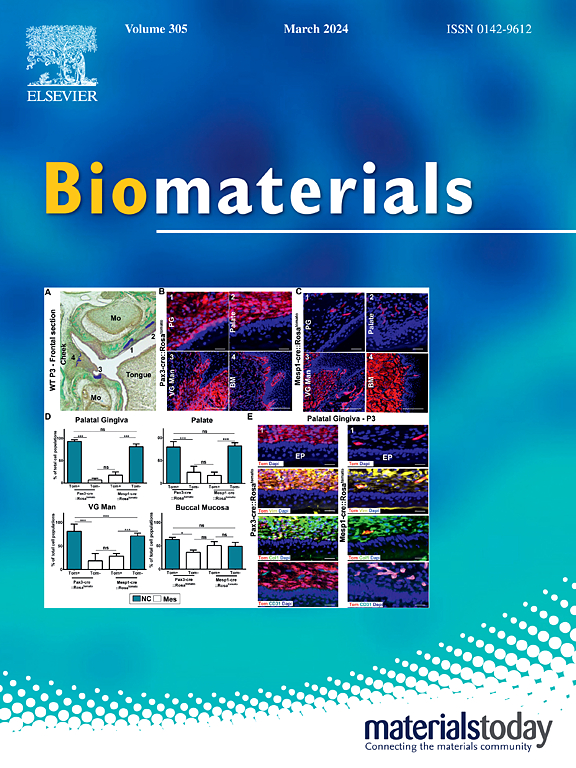Oral delivery of chitosan-bilirubin nanoparticles alleviates hepatic inflammation and fibrosis in metabolic dysfunction-associated steatohepatitis
IF 12.8
1区 医学
Q1 ENGINEERING, BIOMEDICAL
引用次数: 0
Abstract
Metabolic dysfunction-associated steatohepatitis (MASH) is a severe chronic liver disease that often leads to complications, such as cirrhosis and hepatocellular carcinoma. Despite intensive research and development efforts, there are relatively few approved therapeutics for MASH. Here, we report an oral nanomedicine comprising bilirubin-conjugated low molecular weight water-soluble chitosan (designated LMWC-BRNPs) that can alleviate oxidative stress and lipogenesis in liver to treat MASH in a mouse model. Upon oral administration, LMWC-BRNPs were readily absorbed and reached the liver in a mouse model of MASH generated using a methionine and choline-deficient (MCD) diet. Orally administered LMWC-BRNPs were primarily taken up by liver macrophages and hepatic stellate cells (HSCs) and could modulate dysregulated hepatic immunity to alleviate inflammation in the livers of MASH mice. Orally administered LMWC-BRNPs also prevented uncontrolled fat deposition by activating peroxisome proliferator-activated receptor-alpha (PPAR-α) and its target genes, and thereby reduced fibrosis. These findings suggest that our bilirubin-based nanomedicine, which has a unique action mode and potent therapeutic efficacy, has the potential to be translated as an oral therapeutic for treating MASH in patients.

口服壳聚糖胆红素纳米颗粒减轻代谢功能障碍相关脂肪性肝炎的肝脏炎症和纤维化
代谢功能障碍相关脂肪性肝炎(MASH)是一种严重的慢性肝病,常导致并发症,如肝硬化和肝细胞癌。尽管进行了大量的研究和开发工作,但获得批准的治疗MASH的药物相对较少。在这里,我们报道了一种口服纳米药物,该药物含有胆红素偶联的低分子量水溶性壳聚糖(指定为LMWC-BRNPs),可以减轻肝脏氧化应激和脂肪生成,以治疗小鼠模型中的MASH。口服给药后,LMWC-BRNPs在蛋氨酸和胆碱缺乏(MCD)饮食产生的MASH小鼠模型中很容易被吸收并到达肝脏。口服LMWC-BRNPs主要被肝巨噬细胞和肝星状细胞(hsc)吸收,可以调节失调的肝脏免疫,减轻MASH小鼠肝脏炎症。口服LMWC-BRNPs还通过激活过氧化物酶体增殖物激活受体α (PPAR-α)及其靶基因来阻止不受控制的脂肪沉积,从而减少纤维化。这些发现表明,我们基于胆红素的纳米药物具有独特的作用模式和强大的治疗效果,有可能转化为治疗MASH患者的口服治疗药物。
本文章由计算机程序翻译,如有差异,请以英文原文为准。
求助全文
约1分钟内获得全文
求助全文
来源期刊

Biomaterials
工程技术-材料科学:生物材料
CiteScore
26.00
自引率
2.90%
发文量
565
审稿时长
46 days
期刊介绍:
Biomaterials is an international journal covering the science and clinical application of biomaterials. A biomaterial is now defined as a substance that has been engineered to take a form which, alone or as part of a complex system, is used to direct, by control of interactions with components of living systems, the course of any therapeutic or diagnostic procedure. It is the aim of the journal to provide a peer-reviewed forum for the publication of original papers and authoritative review and opinion papers dealing with the most important issues facing the use of biomaterials in clinical practice. The scope of the journal covers the wide range of physical, biological and chemical sciences that underpin the design of biomaterials and the clinical disciplines in which they are used. These sciences include polymer synthesis and characterization, drug and gene vector design, the biology of the host response, immunology and toxicology and self assembly at the nanoscale. Clinical applications include the therapies of medical technology and regenerative medicine in all clinical disciplines, and diagnostic systems that reply on innovative contrast and sensing agents. The journal is relevant to areas such as cancer diagnosis and therapy, implantable devices, drug delivery systems, gene vectors, bionanotechnology and tissue engineering.
 求助内容:
求助内容: 应助结果提醒方式:
应助结果提醒方式:


